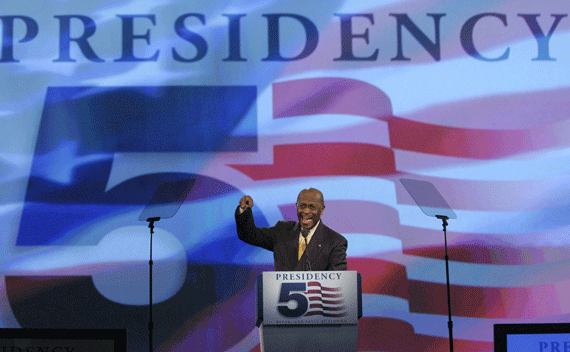Campaign 2012: Herman Cain on Foreign Policy
More on:

Now that Herman Cain has surged to the top of the polls, his foreign policy views are getting some scrutiny. Conor Friedersdorf thinks his views on the use of force are “divisive.” Dan Drezner thinks that Cain’s views flunk the Turing test. Ben Smith agrees with Dan that Cain is “clueless” on foreign policy but nonetheless thinks that “President Cain will probably be O.K.”
Cain is catching flak for answering an interviewer’s question about “gotcha” questions by deliberately mispronouncing “Uzbekistan” and dismissing it as one of “these small insignificant states”:
Click here to view this video on YouTube.
Joshua Foust argues that Uzbekistan “must be at the heart of any successful security policy for Central and South Asia.” Among other things, Uzbekistan is part of the critical northern transit corridor that enables the United States to deliver materiel to U.S. troops in Afghanistan without going through Pakistan. That’s critical because it gives Washington some freedom to press Islamabad on issues critical to the United States.
David Gregory tried to draw Cain out on foreign policy during his “Meet the Press” interview on Sunday. As he often does, Cain quickly shifted away from policy specifics and to saying he needed more information before making a decision. When Gregory asked “What do you say to Americans who wonder whether you’re ready at this point to be commander in chief,” Cain answered:
I would say to them, “First of all, consider my philosophy to foreign policy and my principles.” That’s where you start. You can collect the information and make an informed decision. My philosophy is an extension of the Reagan philosophy, peace through strength and clarity. It’s not clear who all of our friends are. It’s not clear who our enemies are. I believe we need to clearly define who our friends are, clearly define who our enemies are, and then let the rest of the world know we will stand by our friends.
I remain skeptical that Cain can continue to get by with generic answers like this, especially since in front of partisan audiences he gets very specific--though not terribly accurate. This weekend Cain lambasted Obama’s Iraq policy at a rally in Tennessee:
The Iraqis are making good progress with the help of those 43,000 [U.S. troops]. So what does he [Obama] do? He goes off and says we’re going to by the end of the year pull out 40,000 troops. I’m sorry if this is not politically correct, but that is a dumb thing to do.
This glosses over the fact that the Iraqi government hasn’t been eager for U.S. troops to stay in Iraq beyond December 31, or at least not on terms that Washington would find acceptable. Just this month Iraqi political leaders announced that they had agreed that any U.S. troops that stayed in Iraq beyond the end of the year would not be granted immunity from Iraqi law. The United States is not going to put American soldiers in a position where they could be tried by Iraqi courts.
If Cain remains at the top of the polls in a few weeks, the odds are good that some of his GOP rivals will use the November 15 national security debate to give him the “piñata” treatment.
More on:
 Online Store
Online Store